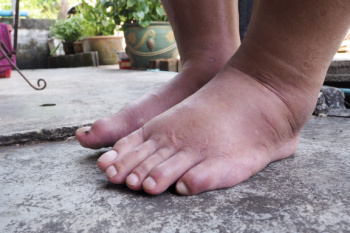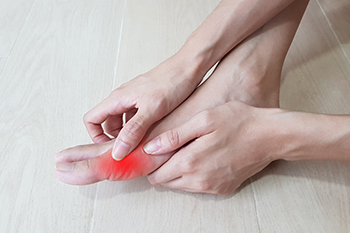Connect With Us
Blog
Items filtered by date: September 2024
Lymphedema in the Feet Is More Than Just Swelling

Lymphedema in the feet occurs when lymph fluid builds up in the tissues, causing swelling. This condition results from a blockage or damage in the lymphatic system, which is responsible for draining excess fluid from tissues and returning it to the bloodstream. Lymphedema can be caused by infections, surgery, radiation treatment for cancer, or congenital conditions where the lymphatic system is underdeveloped. People at a higher risk include those who have undergone cancer treatments, have had lymph node removal, or suffer from chronic venous insufficiency. Treatment focuses on managing the swelling and improving lymph drainage. Compression therapy, such as wearing specialized stockings, is commonly used. Manual lymph drainage, a specialized massage technique used by a podiatrist, can help reduce swelling. If your feet are swollen and you are not clear on the cause, it is strongly suggested that you see a podiatrist for a proper diagnosis and care.
Some foot conditions may require additional professional care. If you have any concerns, contact Richard M. Allen, DPM of Idaho. our doctor can provide the care you need to keep you pain-free and on your feet.
Rare Foot Conditions
The majority of foot conditions are common and can be treated by a podiatrist. Standard diagnostic procedures are generally used to identify specific conditions and treatment can be rendered. A podiatrist also treats rare foot conditions which can be difficult to diagnose and may need extra attention and care.
There are many rare foot conditions that can affect children. Some of these can include:
- Freiberg’s disease
- Kohler’s disease
- Maffucci syndrome
Freiberg’s disease - This can be seen as a deterioration and flattening of a metatarsal bone that exists in the ball of the foot. It typically affects pre-teen and teenage girls, but can affect anyone at any age. Symptoms that can accompany this can be swelling, stiffness, and the patient may limp.
Kohler’s disease - This often targets the bone in the arch of the foot and affects younger boys. It can lead to an interruption of the blood supply which ultimately can lead to bone deterioration. The patient may limp or experience tenderness, swelling, and redness.
Maffucci syndrome - This affects the long bones in a child’s foot leading to the development of abnormal bone lesions. They are benign growths and typically develop in early childhood and the bones may be susceptible to breaking.
A podiatrist can properly diagnose and treat all types of rare foot conditions. If your child is affected by any of these symptoms or conditions, please don’t hesitate to call our office so the correct treatment method can begin.
If you have any questions please feel free to contact our office located in Lewiston, ID . We offer the newest diagnostic tools and technology to treat your foot and ankle needs.
The Importance of Non-Slip Shoes in the Restaurant Industry

In the restaurant industry, wearing non-slip shoes are essential for workers, ensuring safety and preventing accidents. These shoes are designed with specialized outsoles that provide superior traction on slippery surfaces, such as spills or grease. A key feature of non-slip shoes is their rubber or polyurethane soles, which are engineered to grip various floor types effectively. The tread patterns on these soles are often designed to channel liquids away from the foot, reducing the risk of slips and falls. Additionally, the material of the sole plays a significant role in maintaining stability. If you have injured your foot during your work day, it is suggested that you visit a podiatrist who can treat various foot conditions, and educate you on what type of shoes to wear for your job.
While working on the feet, it is important to take the proper care of them. For more information about working on your feet, contact Richard M. Allen, DPM from Idaho. our doctor will treat your foot and ankle needs.
Working on Your Feet
Standing on your feet for long periods of time can cause stress and pain in your feet. Your whole body may experience change in terms of posture, back pain, bunions, callouses and or plantar warts. There are ways to avoid these conditions with proper foot care, smart choices and correct posture.
Positive Changes
Negative heeled shoe – Choosing this shoe type places the heel slightly lower than the ball of the foot. These are great for overall foot health. Find shoes that fit you correctly.
Go barefoot – Our feet were not designed to be enclosed for all hours of the day. Try to periodically expose your feet to air.
Eliminate Pain
Foot Exercises – Performing simple exercises, incorporating yoga and doing stretches are beneficial. This will allow increased blood flow to the area and muscles of the foot.
Achilles tendon – Stretching the foot out flat on the floor will relax the calf muscles and tendon. These exercises can be performed almost anywhere. Make sure you add these exercises to your daily regimen.
With a little bit of this information and knowing more about foot health, you will notice changes. Foot stretches and proper footwear will help with pain and prevent further issues.
If you have any questions please feel free to contact our office located in Lewiston, ID . We offer the newest diagnostic and treatment technologies for all your foot and ankle needs.
Managing Gout Pain

Gout is a form of arthritis that often targets the big toe, causing sudden, intense pain, swelling, and redness in the joint. This happens when uric acid crystals build up in the joints, leading to inflammation. During a gout attack, the affected joint, especially the big toe, can become extremely painful, making even light contact unbearable. Treatment focuses on relieving the pain and inflammation quickly, usually with medications like NSAIDs, colchicine, or steroids. These are most effective when taken as soon as the attack begins. To prevent future flare-ups, a podiatrist may prescribe medication that lowers uric acid levels in the blood, helping to dissolve the crystals and prevent new ones from forming. Restricting intake of certain foods that contribute to uric acid build up is also important. A podiatrist can diagnose gout and offer effective treatments to manage both the immediate pain and long-term prevention. If you are experiencing pain from gout, it is suggested that you schedule an appointment with a podiatrist.
Gout is a foot condition that requires certain treatment and care. If you are seeking treatment, contact Richard M. Allen, DPM from Idaho. our doctor will treat your foot and ankle needs.
What Is Gout?
Gout is a type of arthritis caused by a buildup of uric acid in the bloodstream. It often develops in the foot, especially the big toe area, although it can manifest in other parts of the body as well. Gout can make walking and standing very painful and is especially common in diabetics and the obese.
People typically get gout because of a poor diet. Genetic predisposition is also a factor. The children of parents who have had gout frequently have a chance of developing it themselves.
Gout can easily be identified by redness and inflammation of the big toe and the surrounding areas of the foot. Other symptoms include extreme fatigue, joint pain, and running high fevers. Sometimes corticosteroid drugs can be prescribed to treat gout, but the best way to combat this disease is to get more exercise and eat a better diet.
If you have any questions please feel free to contact our office located in Lewiston, ID . We offer the newest diagnostic and treatment technologies for all your foot and ankle needs.
